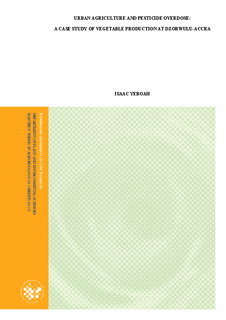| dc.contributor.author | Yeboah, Isaac | |
| dc.date.accessioned | 2014-02-03T10:11:09Z | |
| dc.date.available | 2014-02-03T10:11:09Z | |
| dc.date.copyright | 2013 | |
| dc.date.issued | 2014-02-03 | |
| dc.identifier.uri | http://hdl.handle.net/11250/189637 | |
| dc.description.abstract | Urban Agriculture is crucial to the supply of food especially fresh vegetables in many urban areas including Accra. In addition to the supply of food, it serves as a source of employment and income for many urban dwellers. However, most urban farmers resort to the use of pesticides in controlling the pest pressures they face.
The Dzorwulu Plant Pool Site in Accra was used as a case study to explore the attitudes of urban farmers towards the use of pesticide, assess the threats they face by using pesticide and together with them, identify alternative ways of controlling pest. By employing convenience and purposive sampling techniques, 15 farmers and 5 other stakeholders were selected for data collection through participant observation, interviews and focus group discussions. Secondary data was used in the study.
The use of chemical pesticides was found to be the sole means by which the farmers controlled pest. The farmers feel spraying with chemicals is not only effective, it is also the only viable option available to them at the moment. Even though they are aware of other pest control strategies such as Integrated Pest Management (IPM), they lacked in-depth knowledge about the principles of IPM and hence employ it to control pests.
The use of pesticides poses serious health hazards to both farmers and consumers of fresh vegetables, in addition to the serious environmental damage it causes. The Dzorwulu farmers reported health conditions such as dizziness, skin and nausea irritations after spraying. This is mainly due to the inappropriate handling and mixing of the chemicals as well as the non-use of personal protective clothing on the part of farmers during spraying. Pesticide residues on vegetables and other food products due to indiscriminate spraying also pose serious health threat to consumers and the environment.
Even though the farmers rely only on pesticide as a way of controlling pest, they are willing to adopt sustainable pest control strategies such as IPM. However, they are calling for serious research and training on the part of government so that whatever alternative strategy introduced to them can be effective in controlling to pest to facilitate adoption. | no_NO |
| dc.language.iso | eng | no_NO |
| dc.publisher | Norwegian University of Life Sciences, Ås | |
| dc.subject | Urban Agriculture | no_NO |
| dc.subject | Agroecology | no_NO |
| dc.title | Urban Agriculture and pesticide overdose : a case study of vegetable production at Dzorwulu- Accra | no_NO |
| dc.type | Master thesis | no_NO |
| dc.subject.nsi | VDP::Agriculture and fishery disciplines: 900::Agriculture disciplines: 910::Plant breeding, horticulture, plant protection, plant pathology: 911 | no_NO |
| dc.subject.nsi | VDP::Mathematics and natural science: 400::Zoology and botany: 480::Ecology: 488 | no_NO |
| dc.source.pagenumber | 39 | no_NO |
